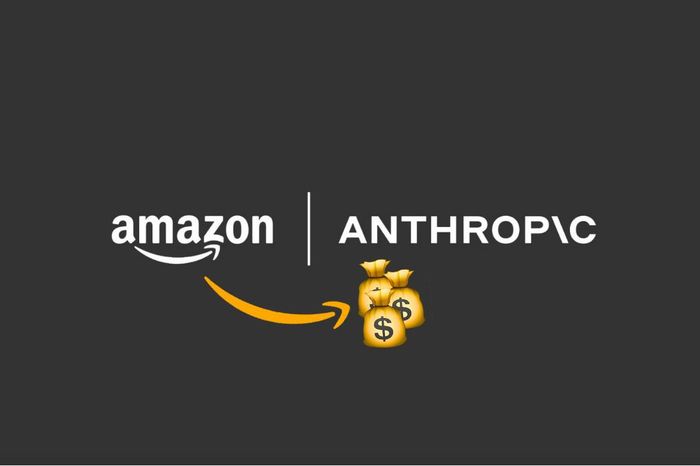Rushing to invest in generative AI because of FOMO?
Due to the unfavorable legal environment, technology giants are not making as many acquisitions as before. Instead, they spend billions on the 'next big thing'.
Amazon's $2.75 billion investment in AI startup Anthropic is the company's largest joint venture ever. It's also the latest example of the AI 'fever' that's forcing the biggest tech companies to open their wallets.
Anthropic is the developer of the Claude AI model, which competes with OpenAI's GPT and Google's Gemini. From Meta to Apple, all are racing to integrate AI into their product and feature portfolios to ensure they don't get left behind in a market predicted to reach $1 billion in revenue within a decade.

Amazon is among the technology giants opening their wallets to generative AI startups. Photo: Synthesia
According to PitchBook, in 2023, investors pumped a total of $29.1 billion into nearly 700 generative AI deals, an increase of more than 260% in value compared to the previous year.
A significant portion of that money is strategic, coming from technology companies rather than venture capitalists or other institutions. Fred Havemeyer, head of US software and AI research at Macquarie, said that fear of missing out (FOMO) is a driving factor in their decisions.
"They definitely don't want to miss out on the opportunity to be part of the AI ecosystem," Havemeyer said. "I definitely have FOMO in this market."
Huge investments are required as AI models are notoriously expensive to build and train, requiring thousands of specialized chips. Meta, which is developing its own model Llama, revealed it is spending billions of dollars on Nvidia GPUs.
Whether following the path of construction or investment, there are only a few companies with enough potential to play in the market. In addition to chip development, Nvidia has emerged as one of Silicon Valley's leading investors, taking stakes in several emerging AI companies. Similarly, Microsoft, Google, and Amazon sometimes offer cloud credits as part of the investment.
In the Amazon - Anthropic agreement, the two sides will cooperate closely in many different ways. Anthropic uses Amazon Web Services (AWS) for its computing needs as well as Amazon chips. Anthropic's models will be distributed by Amazon to AWS customers. Earlier this month, Anthropic launched Claude 3, its most powerful model and allows users to upload photos, charts, documents and other types of unstructured data for analysis and responses.
Microsoft has participated in AI investments before with $1 billion for OpenAI in 2019. The scale of its investment has increased to about $13 billion. Microsoft uses many of OpenAI's models and offers open source models on its Azure cloud.
Alphabet – Google's parent company – plays two roles as builder and investor. The company refocused product development on generative AI and the Gemini model, adding features for search, documents, maps. Last year, Google pledged to invest $2 billion in Anthropic, after when confirming the purchase of a 10% stake in this startup in addition to a large cloud contract between the two companies.
Havemeyer commented that the above investments are in line with their product roadmap. "I don't think it's frivolous," he said. According to experts, alliances with large cloud providers not only bring much-needed cash to startups but also help them get more customers.
'Shaping the next decade'
In recent earnings calls, tech leaders reiterated their vision for generative AI, making it clear to investors that they have to spend money to make money, whether developed in-house or through Invest in startups.
Microsoft Chief Financial Officer Amy Hood said it will continue to prioritize investments in AI, "which will shape the next decade."
The leaders of Google, Apple and Amazon also opened up about their willingness to cut costs drastically to redirect more funding to AI efforts.
Startups are among the beneficiaries.
In addition to OpenAI, Microsoft also holds stakes in Mistral, Figure and Humane. The company invested in Inflection AI before the startup essentially folded and joined Microsoft in March. Mistral focuses on open source, uses the Azure cloud, and provides services to Azure customers.
Figure, a startup seeking to build robots that walk like humans, has raised money from Microsoft, OpenAI and Nvidia and is valued at $2.6 billion.
Amazon's biggest bet is Anthropic, pouring in a total of $4 billion to date. The company has also invested in AI platform developer Hugging Face.
Google's investments include Essential AI, which is developing AI programs for consumers and is backed by AMD and Nvidia. Alphabet and Nvidia are also pouring money into Runway ML, an AI company known for its video editing and visual effects tools. Other companies in Nvidia's portfolio are Mistral, Perplexity and Cohere.
Meanwhile, many Big Tech continue to spend internally to develop their own models. Microsoft invests in many of the foundational technologies for generative AI through its Microsoft Research division. Amazon reportedly plans to train a larger, more data-hungry model than OpenAI's GPT-4.
Apple researchers recently published details of their work with MM1, a family of small AI models that can take both text and image input. Media reported that Apple is looking for AI partners, including Google in the US and Baidu in China.